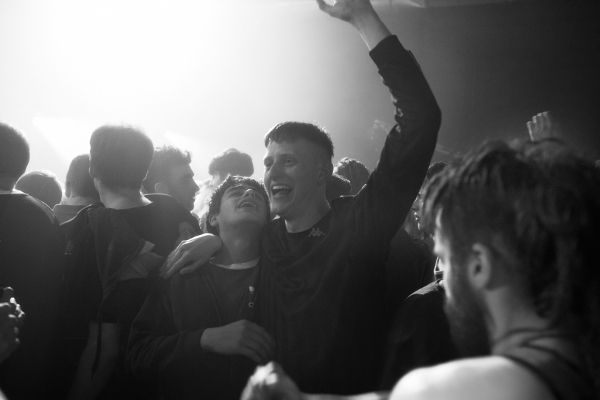Eye For Film >> Movies >> Beats (2019) Film Review
Beats
Reviewed by: Andrew Robertson

Based on a play, crisply captured in a sharp black and white punctuated by important colour, Beats is set during what many feared was the swansong of rave - the summer of 1994. It'll capture the hearts of many of a certain age - in documentary detail it delves through various underworlds of pirate radio and parties in fields and learner drivers and pre-Police Scotland Scottish Police standard-issue moustaches. It's a treat, a banger if you will.
Mashed up into its melange of club beats and gang ties are some excellent performances - worth singling out is Lorn Macdonald's Spanner, spiritual kin to Trainspotting's Spud not just in haircuts but haplessness. Life has been unkind, opportunities have been few, and things are never just black and white.

It's set in Nineties West Lothian but locations around Scotland have been used - you've got to keep on pretty far in West Lothian to get to Glasgow's East End, and even further to get to Govanhill. This is likely only ever going to be an issue for Scottish audiences, but as it's sold out three screens as the Glasgow Film Festival 2019's closing gala I wager a few folk will notice. There's pretty common causes though across the Central Belt - not for nothing does your reviewer refer to Dennistoun as Glasgow's Leith. The presence of a post-big number change kebab shop telephone line doesn't detract from a simple test to determine if this'll speak to you - if you can complete the sequence that starts 0181 811 then this might be the film for you.
If you remember the wonder years of MDMA and motorways then this'll definitely be for you. That Pulp's Sorted For E's And Whizz isn't on the soundtrack is perhaps because of its structural similarities, but this isn't a somewhere in a field in Hampshire but an M8 one. Ate one ecstasy tablet? Then you'll hopefully recognise the blend of sound and vision, video art, slit-scan colour flash from the well-before of 2001, the distortions and digressions and divestment of self-consciousness that come towards the climax, but that's getting ahead of ourselves. There's a lot to enjoy before, and quite a bit after.
The soundtrack is solid, but I worry that there's been a tendency towards the overly credible - there are Prodigy tunes, but I distinctly recall a greater fondness for the scrattier techno end of their output and so was disappointed that as it creates a sense of time and place there wasn't any Out Of Space. Yet that matters less in the context of what amounts to historical re-enactment, an immaculate Sierra Cosworth, slammed Golfs, and in later sequences a slightly greater degree of anachronism - the portentous presence of footage off the as-then-yet-undemolished Ravenscraig in triple-exposed high-bpm trance status is forgiveable. There's probably an electronica joke to be made about the word de-industrialisation but I won't be brought as low.
This is niggling, because this is a good, joyous, film. Heartwarming, given (especially by its textual coda) to a particular melancholy, possessed of maw-blanchingly accurate dialogue, and often laugh out loud funny, rooted in two strong central performances (Cristian Ortega's Johnno is Spanner's best friend, and vice versa), immersed in something that if not quite historically perfect at least samples things that seem to be, Beats is almost unbeatable entertainment.
For the right crowd. Criminal Justice and the Public Order Act 1994's Section 63 (1)(b) was perhaps as clear a declaration of war against a group as Section 28 of the Local Government Act 1988. It didn't name the modernity and fairness it was seeking to drive out as explicitly as the campaign against 'promoting homosexuality' but it did give Police powers triggered by the presence of music 'wholly or predominantly characterised by the emission of a succession of repetitive beats.' Ones paralleled by riot squads warming up, ones paralleled by crisp editing, direction more settled than the ostensible aimlessness of the protagonists.
A fourth feature for Brian Welsh (whose most-watched work is probably Black Mirror episode The Entire History Of You) and co-written by him with playwright Keiran Hurley, this is the kind of film that will mean an awful lot to some and something to a lot fewer. It's not that youth isn't universal, nor indeed universally wasted on the young, nor that it manages to have its cake and save some for later by dealing with all the sides of the romance of rave culture (that's the two fish and the cardboard box).
It's got something to say about opportunity, about deprivation, and its politics are at times very much of the 2010s - a breakfast reference is inescapably coded. Red is the most common injection of colour, a habit it shares with another GFF musical film, Summer, but where there it was often dresses and lyrics here it's most often the power light on a boom-box. A tiny little light, more GBX than HAL, but important nonetheless. For some it will be just noise, black and white, albeit not static, but it's more than enough to move, to get audiences amped up, and if you're tuned to the right wavelength Beats will have you bouncing.
Reviewed on: 03 Mar 2019















